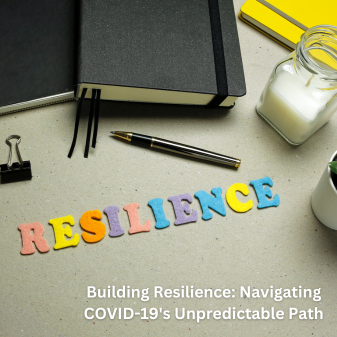Building Resilience: Navigating COVID-19’s Unpredictable Path

Chandrayaan-3 A Triumph of Perseverance
July 12, 2023
Shaswata Kapat
September 30, 2024The COVID-19 pandemic brought an unprecedented wave of uncertainty, impacting health, livelihoods, and everyday life. Navigating such unpredictability has been challenging, but many have found ways to build resilience, cope with change, and emerge stronger. One of the first steps to managing uncertainty is accepting that not everything is within our control. Practicing mindfulness—whether through meditation, deep breathing, or simply being present in the moment—can alleviate anxiety and improve focus. Mindfulness encourages us to respond to the situation with calm rather than fear, helping us process emotions without becoming overwhelmed. Studies show that even brief, daily mindfulness exercises can reduce stress and provide a sense of stability.
Setting routines has also proven invaluable. When so much felt unpredictable, establishing daily or weekly routines created a sense of normalcy. Simple actions like setting up a workspace, scheduling breaks, and organizing family activities provided a familiar structure, making each day feel less chaotic. For those with children, routines allowed for shared responsibilities and added structure to education and play, giving everyone in the family a way to adapt together. Connection with others has been essential for emotional support. Social distancing measures may have kept us physically apart, but people quickly embraced virtual connections. Regular video calls, online group activities, and social media engagement allowed friends and families to stay in touch. Beyond personal circles, communities came together to provide resources, organize online events, and support each other. Volunteering—whether by providing essentials to those in need or participating in online mental health support groups—has given many people a sense of purpose amid the unknown.
Focusing on personal growth also proved helpful for many. The extra time at home allowed people to revisit hobbies, start new projects, and pursue skills they might have neglected. Engaging in creative activities, exercising, or enrolling in online courses offered a positive outlet for energy and helped reduce feelings of stagnation. By investing in self-growth, individuals could transform isolation into a period of personal transformation. Finally, resilience is strengthened through gratitude. Even in times of hardship, acknowledging small positives—whether good health, supportive relationships, or daily comforts—can reframe one’s outlook and foster optimism. Keeping a gratitude journal or sharing moments of thankfulness with others can remind us of the positives in life, even when situations are bleak. As we navigate the ongoing uncertainties of a post-pandemic world, these practices of mindfulness, routine-building, connection, self-growth, and gratitude remain powerful tools. COVID-19 has been a profound lesson in resilience, and while the challenges have been great, so too has been our capacity to adapt and grow. By focusing on what we can control and supporting each other, we continue to find hope and strength in the face of the unknown.


